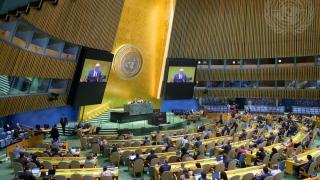Foster Dialogue Among Civilizations: End Britain’s Imperial Grip on Economic and Political Policy
By Jason RossJune 10, 2025 (EIRNS)—June 10 was the first International Day for Dialogue Among Civilizations, which was voted up last year by the United Nations General Assembly. This initiative comes as part of China’s Global Civilization Initiative, which it sees as an effort to foster a culture of dialogue among different nations and peoples, to achieve shared prosperity.
How should we view the decision by Britain and three of its Five Eyes allies—Australia, Canada, and New Zealand—along with by Norway, to impose sanctions on two extremists members of the Israeli cabinet? The countries released a statement announcing the sanctions that points to the need to uphold international law and human rights of the Palestinians.
But if it seems that the U.K. is doing something definitely good, it’s worth looking deeper.
Consider the effect former British Prime Minister Tony Blair has had in preventing meaningful development toward Israeli-Palestinian peace. This includes his years as the Middle East envoy of the U.S.-Russia-EU-UN “Quartet” from 2007-2015, a position he took just a few years after creating the disastrous invasion of Iraq.
Or think about the British support for Christian Zionist groupings, which are convinced that if they can get the Jews back to their Biblical homeland, Jesus will return and they’ll be raptured.
In this case, is the U.K. reading the writing on the wall—recognizing that history will not judge kindly those who have abetted the destruction of the Palestinian people—and throwing the U.S. under the bus, after coaxing it into acting on its behalf? (Secretary of State Marco Rubio denounced the sanctions and said the U.S. stands “shoulder to shoulder” with Israel.)
NATO Secretary General Mark Rutte was just in London where he called for intensified militarization—telling Britons they had to choose between heavy defense expenditures or “learning Russian.”
According to polling in Russia, Germany and the U.K. have emerged as the nation’s primary enemies according to public opinion, replacing the United States.
Russia has pointed to the need for a U.S.-Russian alliance against European militarism. Russian Foreign Minister Lavrov’s June 9 call to revitalize the Russia-India-China troika represents an alternative to Britain’s divisive policies, especially in fostering conflict between India and China.
Britain’s nefarious influence manifests itself more broadly. Proposed NASA budget cuts threatening America’s nuclear propulsion programs—essential for expanding our power over the nearby Solar System and traveling beyond it—contrast starkly with Britain’s encouragement of aggressive NATO expansions and heavy military investment. Such backward priorities reflect the British imperial preference: perpetual military entanglements and global conflict, rather than scientific advancement and cooperation.
For the United States to realize its true interests—peace, progress, development—it must decisively cast off the legacy and continued influence of the British Empire. Recognizing the Empire’s historical role in igniting regional conflicts is essential for paving the way to a new security architecture.






